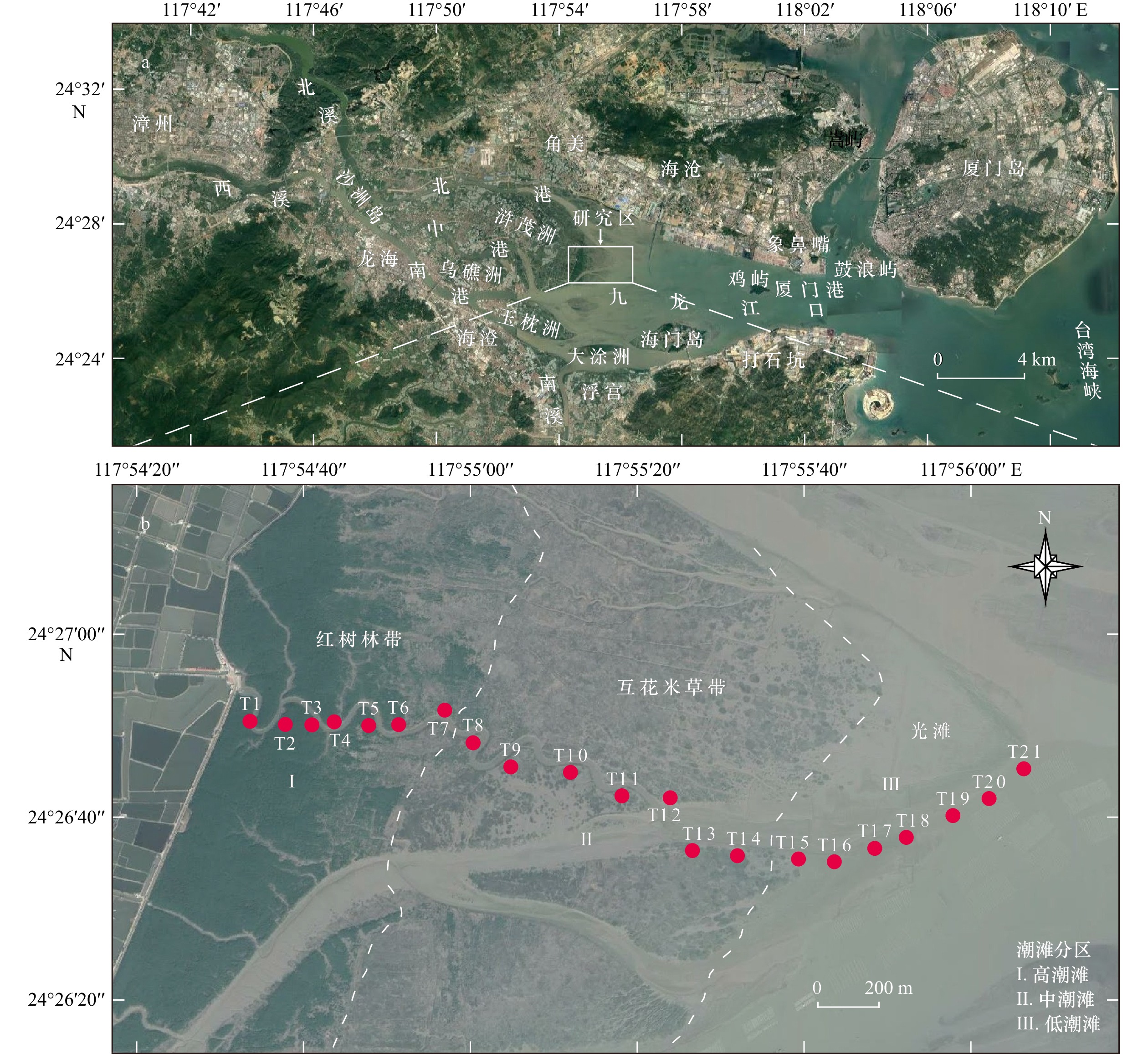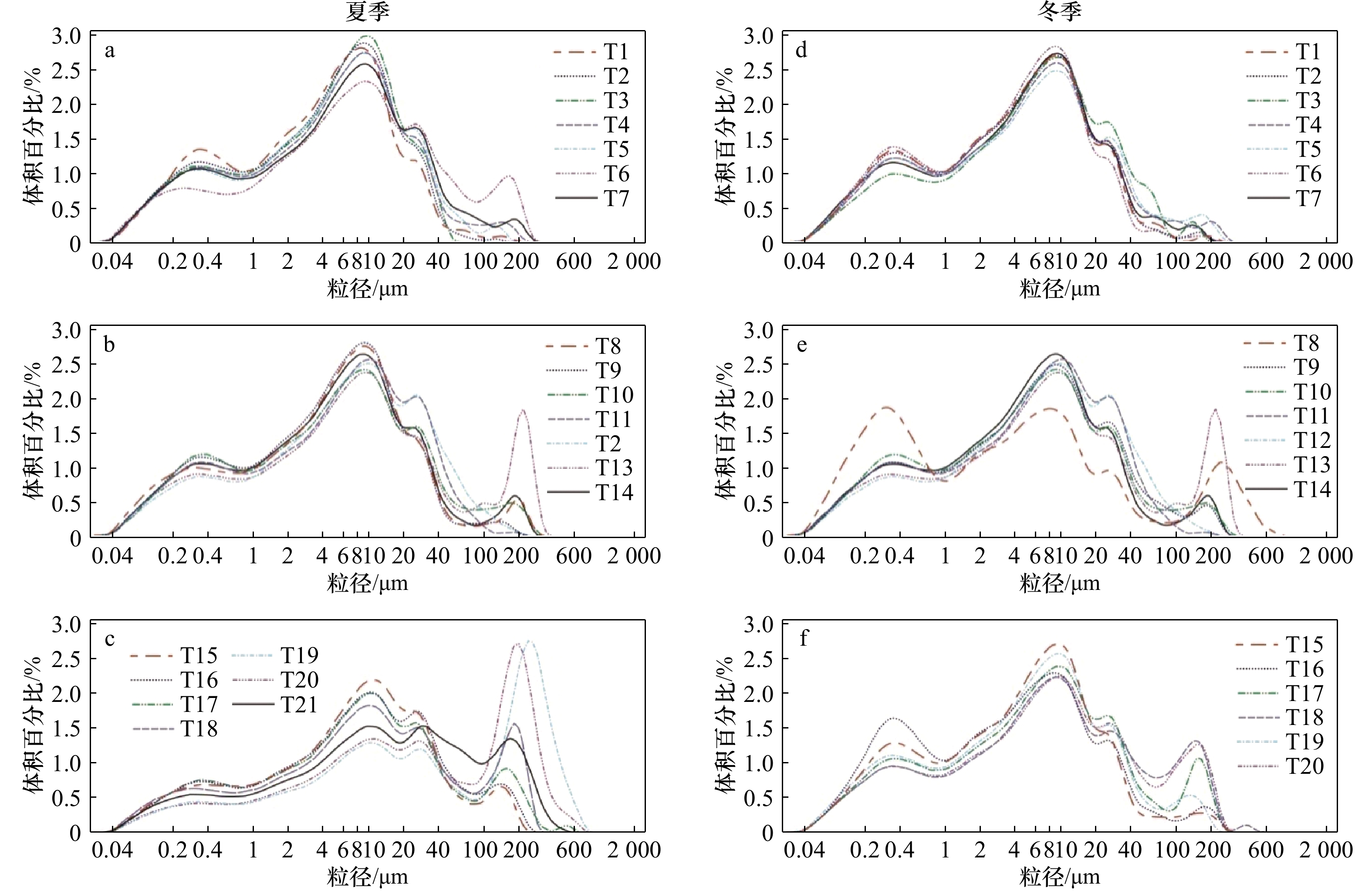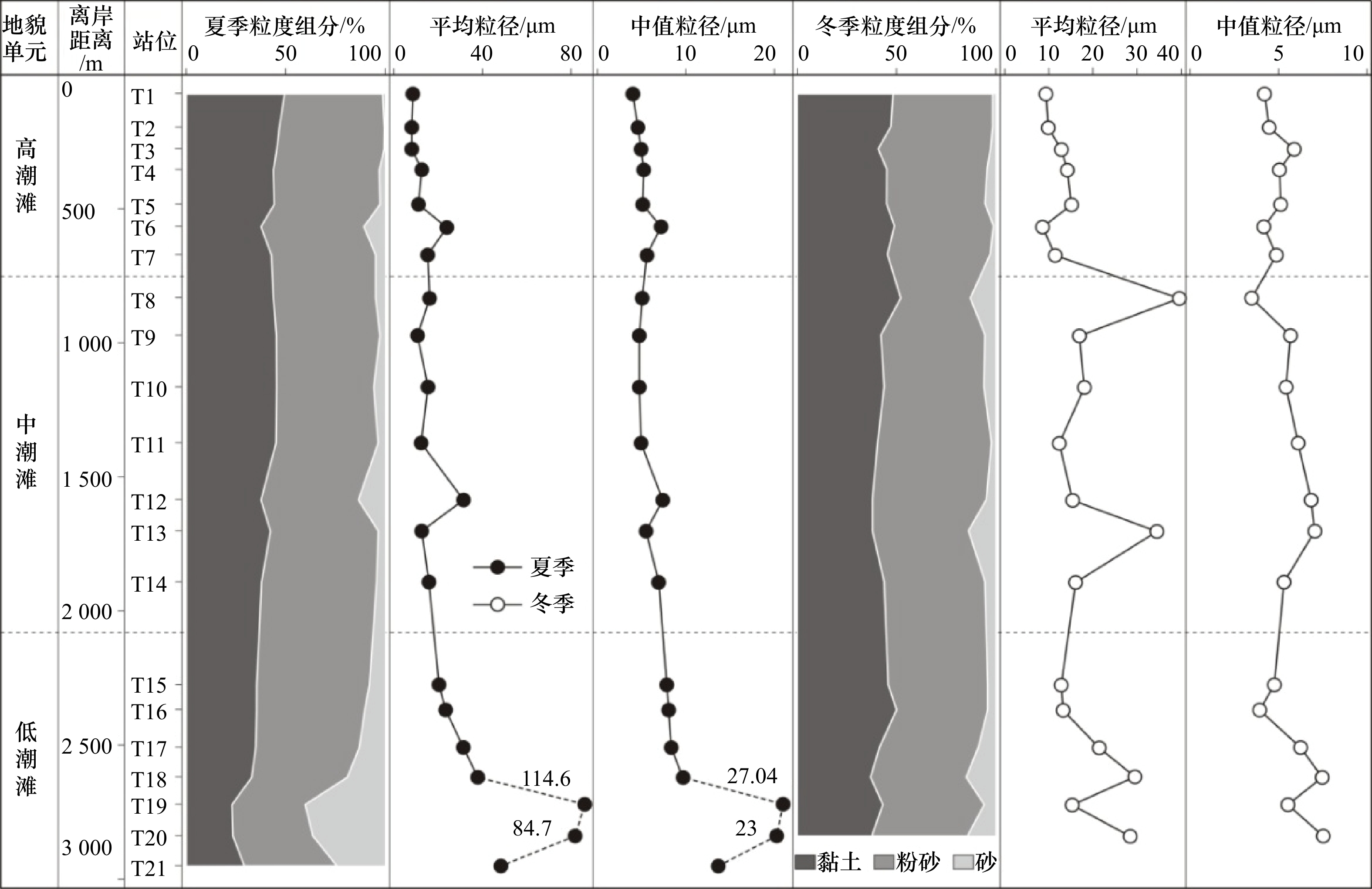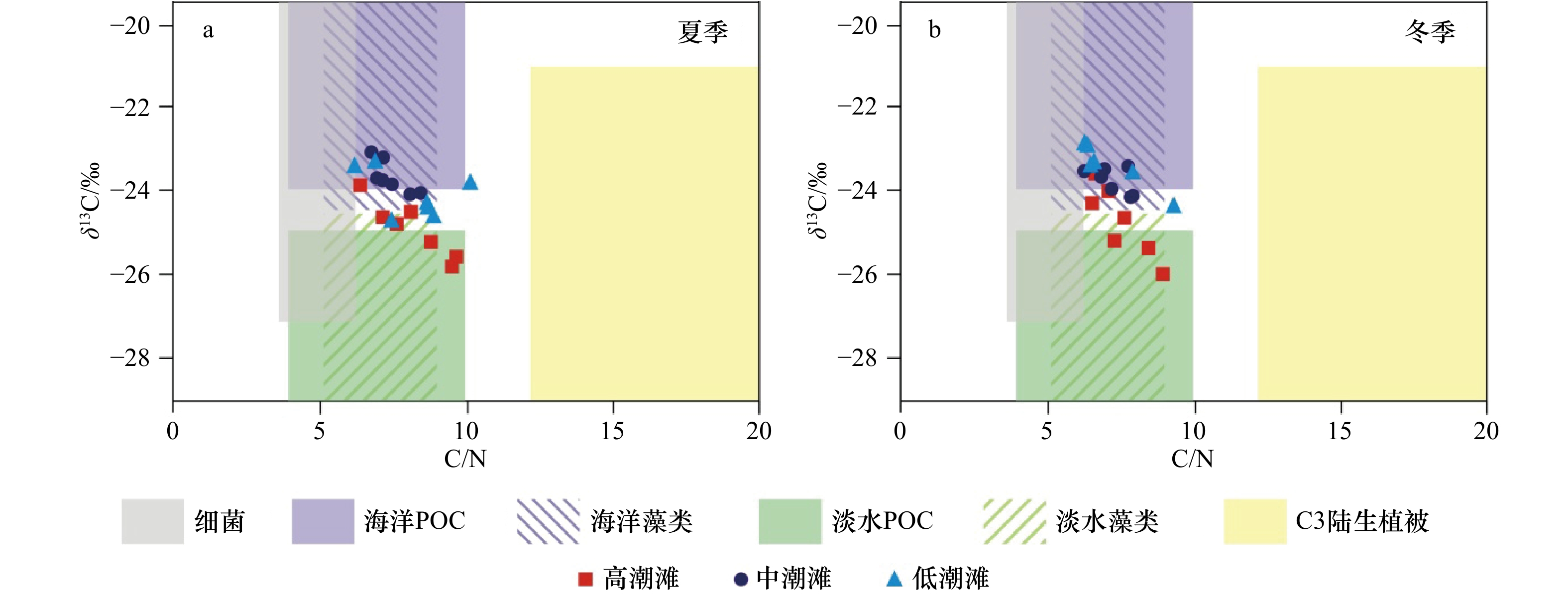Temporal spatial distribution and source of organic matter in tidal flat surficial sediments and their implications for sedimentary environment identification in the Jiulong River Estuary
-
摘要: 本研究旨在揭示九龙江口潮滩有机质含量及其来源的时空分异规律,寻找有效识别潮滩沉积环境的有机碳指标,以便更好地将有机碳应用于河口沉积微相识别和古环境研究。在九龙江口潮滩不同地貌单元,于夏季和冬季采集41个表层沉积物,进行粒度、总有机碳(TOC)、总氮(TN)和稳定碳同位素(δ13C)测试。结果显示:从高潮滩至低潮滩,沉积物粒度逐渐变粗,TOC、TN和C/N变小,δ13C值偏正。高潮滩有机质来源以陆源和红树林贡献为主,中潮滩以海源和互花米草贡献为主,低潮滩以海源贡献为主。九龙江口潮滩有机质的分布和来源受控于河口陆海相互作用的季节变化、潮滩沉积动力分异和潮滩植被分布。高潮滩与中–低潮滩之间,TOC存在显著性差异,TN、δ13C存在极显著性差异,因此参数组合TOC、TN和δ13C可作为高潮滩与中–低潮滩的有效判别指标。Abstract: This article is focus on the distribution and source of organic matter in tidal flat in the Jiulong River Estuary, and to seek effective organic geochemistry proxies for recognize sedimentary microfacies, and thus to help that organic carbon is better applied to identify sedimentary microfacies and paleo-environment. Forty one surficial sediment samples were obtained and measured their grain size, total organic carbon (TOC), total nitrogen (TN), and organic carbon stable isotopes (δ13C) in the tidal flat from three sedimentary environments: upper tidal flat, middle tidal flat and lower tidal flat in summer and winter. The results show that, from upper tidal flat to lower tidal flat, the grain size of sediments becomes coarser gradually with decreasing TOC, TN and C/N, and the increase of δ13C. The sources of organic matter in the upper tidal flat are dominated by terrestrial organic matter and mangrove, marine organic matter and Spartina alterniflora in middle tidal, and marine organic matter in lower tidal flat. The distribution and sources of organic carbon in tidal flat from the Jiulong River Estuary are controlled by the seasonal changes of land-ocean interaction, sedimentary hydrodynamic sorting, and plants. There is a significant difference in TOC, and a highly significant difference in TN and δ13C in sediments of the tidal flat. We thus proposed that organic geochemistry properties TOC, TN and δ13C are the effective indicators to identify upper tidal flat and middle-lower tidal flat in the Jiulong River Estuary.
-
图 2 九龙江河口潮滩微相沉积物粒度曲线
a. 夏季高潮滩,b. 夏季中潮滩,c. 夏季低潮滩,d. 冬季高潮滩,e. 冬季中潮滩,f. 冬季低潮滩
Fig. 2 Volume curves in particle size for samples from differential sedimentary environments of tidal flat in the Jiulong River Estuary
a. Upper tidal flat in summer,b. middle tidal flat in summer,c. lower tidal flat in summer,d. upper tidal flat in winter, e. middle tidal flat in winter,f. lower tidal flat in winter
表 1 九龙江河口潮滩表层沉积物站位信息
Tab. 1 Site information of surficial sediment samples of tidal flat in the Jiulong River Estuary
地貌
单元站位 纬度 经度 离岸距离/m 岩性 夏季 冬季 高潮滩 T1 24°26′39.73′′N 117°54′50.32′′E 71 粉砂质黏土 黏土质粉砂 T2 24°26′39.47′′N 117°54′54.41′′E 196 黏土质粉砂 黏土质粉砂 T3 24°26′39.33′′N 117°54′57.61′′E 277 黏土质粉砂 黏土质粉砂 T4 24°26′39.32′′N 117°54′59.96′′E 354 黏土质粉砂 黏土质粉砂 T5 24°26′39.26′′N 117°55′4.43′′E 483 黏土质粉砂 黏土质粉砂 T6 24°26′39.30′′N 117°55′8.1′′E 566 黏土质粉砂 黏土质粉砂 T7 24°26′40.58′′N 117°55′13.23′′E 672 黏土质粉砂 黏土质粉砂 中潮滩 T8 24°26′37.40′′N 117°55′17.05′′E 832 黏土质粉砂 粉砂质黏土 T9 24°26′34.84′′N 117°55′21.2′′E 972 黏土质粉砂 黏土质粉砂 T10 24°26′34.19′′N 117°55′28.55′′E 1 164 黏土质粉砂 黏土质粉砂 T11 24°26′31.66′′N 117°55′34.77′E 1 373 黏土质粉砂 黏土质粉砂 T12 24°26′31.05′′N 117°55′40.29′′E 1 585 黏土质粉砂 黏土质粉砂 T13 24°26′25.76′′N 117°55′42.99′′E 1 701 黏土质粉砂 黏土质粉砂 T14 24°26′25.15′′N 117°55′48.4′′E 1 891 黏土质粉砂 黏土质粉砂 低潮滩 T15 24°26′25.16′′N 117°55′55.94′′E 2 274 黏土质粉砂 黏土质粉砂 T16 24°26′24.44′′N 117°56′0.18′′E 2 368 黏土质粉砂 粉砂质黏土 T17 24°26′25.85′′N 117°56′5.05′′E 2 508 黏土质粉砂 黏土质粉砂 T18 24°26′27.13′′N 117°56′8.97′′E 2 619 黏土质粉砂 黏土质粉砂 T19 24°26′29.47′′N 117°56′14.41′′E 2 721 粉砂质砂 黏土质粉砂 T20 24°26′31.37′′N 117°56′18.85′′E 2 838 砂质粉砂 黏土质粉砂 T21 24°26′34.51′′N 117°56′23.49′′E 2 948 黏土质粉砂 — 表 2 九龙江河口潮滩表层沉积物粒度参数
Tab. 2 Grain size of surficial sediment samples of tidal flat in the Jiulong River Estuary
季节 地貌单元 黏土/% 粉砂/% 砂/% 平均粒径/μm 中值粒径/μm 标准偏差 偏态 峰态 夏季 高潮滩 均值 44.4 52.3 3.3 12.5 5.2 21.9 4.0 24.0 范围 37.6~49.7 49.0~54.3 0~10.7 8.0~24.2 4.1~7.1 9.3~44.1 1.8~5.9 3.3~50.0 中潮滩 均值 42.6 52.3 5.1 16.1 5.7 32.4 4.3 22.5 范围 37.0~45.8 48.6~57.5 2.2~13.3 10.4~32.3 4.8~7.4 19.7~62.8 2.6~5.3 5.7~35.8 低潮滩 均值 30.5 48.3 21.2 51.5 14.0 77.4 2.5 8.2 范围 22.8~35.4 36.9~56.9 7.8~40.3 20.2~114.6 7.9~27.0 35.1~150.3 1.4~4.0 1.6~22.5 冬季 高潮滩 均值 45.9 51.2 2.9 11.7 4.9 22.5 5.2 37.7 范围 40.9~49.2 49.5~56.1 1.3~5.1 8.6~15.1 4.2~5.9 16.4~31.5 3.9~6.7 20.3~61.5 中潮滩 均值 42.8 50.0 7.2 21.7 5.7 45.1 3.7 16.8 范围 38.1~52.4 34.7~57.6 4.9~14.2 12.3~39.5 3.4~7.1 18.1~97.9 2.5~4.3 4.9~27.1 低潮滩 均值 42.6 49.1 8.4 20.1 5.9 39.2 3.8 17.2 范围 37.1~50.8 45.3~51.5 3.7~14.7 12.7~29.7 3.8~7.5 28.7~54.0 2.5~5.2 5.5~31.6 表 3 九龙江河口潮滩沉积物中总有机碳(TOC)、有机氮(TN)、碳氮比(C/N)和稳定碳同位素(δ13C)数值特征
Tab. 3 Total organic carbon (TOC), total nitrogen (TN), mass ratio of TOC vs TN (C/N) ratio, and organic carbon stable isotopes (δ13C) values for samples from tidal flat in the Jiulong River Estuary
地貌单元 TOC/% TN/% C/N δ13C/‰ 夏季 冬季 夏季 冬季 夏季 冬季 夏季 冬季 高潮滩 均值 1.57 1.47 0.19 0.20 8.13 7.45 −24.92 −24.73 范围 1.10~2.08 1.27~1.92 0.17~0.22 0.18~0.22 6.35~9.62 6.49~8.88 −25.81~−23.88 −25.99~−23.60 中潮滩 均值 1.22 1.25 0.16 0.17 7.38 7.20 −23.68 −23.76 范围 1.00~1.41 1.08~1.38 0.14~0.18 0.16~0.19 6.72~8.39 6.21~7.87 −24.08~−23.08 −24.15~−23.43 低潮滩 均值 0.95 1.13 0.12 0.16 8.07 7.11 −24.12 −23.44 范围 0.74~1.17 1.01~1.32 0.09~0.13 0.14~0.18 6.14~10.06 6.30~9.23 −24.76~−23.32 −24.36~−22.98 表 4 不同有机质来源在九龙江河口潮滩沉积物中的贡献
Tab. 4 Contribution rate of different organic matter sources of tidal flat sediments in the Jiulong River Estuary
地貌单元 陆源POM/% 海洋浮游植物/% 红树林/% 互花米草/% 夏季 冬季 夏季 冬季 夏季 冬季 夏季 冬季 高潮滩 均值 34.8 34.4 17.5 18.7 37.3 35.7 10.4 11.17 范围 31.8~38.4 28.2~38.3 12.3~25.2 12.9~26.2 28.5~48.2 28.2~52.3 7.4~14.4 6.6~15.7 中潮滩 均值 32.8 33.3 25.1 24.7 26.3 27.0 15.8 15.23 范围 28.7~36.8 31.6~35.3 22.5~28.5 22.1~26.4 23.5~30.0 23.0~32.0 13.5~19.3 13.4~16.6 低潮滩 均值 34.4 30.1 22.5 26.8 29.5 25.9 13.5 17.18 范围 30.3~37.3 27.8~34.0 18.7~27.6 25.5~29.1 24.3~35.6 23.2~32.0 10.9~17.2 12.4~19.9 -
[1] 王法明, 唐剑武, 叶思源, 等. 中国滨海湿地的蓝色碳汇功能及碳中和对策[J]. 中国科学院院刊, 2021, 36(3): 241−251.Wang Faming, Tang Jianwu, Ye Siyuan, et al. Blue carbon sink function of Chinese coastal wetlands and carbon neutrality strategy[J]. Bulletin of Chinese Academy of Sciences, 2021, 36(3): 241−251. [2] 刘敏, 侯立军, 许世远, 等. 长江口潮滩有机质来源的C、N稳定同位素示踪[J]. 地理学报, 2004, 59(6): 918−926. doi: 10.3321/j.issn:0375-5444.2004.06.015Liu Min, Hou Lijun, Xu Shiyuan, et al. Carbon and nitrogen stable isotopes as tracers to source organic matter in the Yangtze Estuary[J]. Acta Geographica Sinica, 2004, 59(6): 918−926. doi: 10.3321/j.issn:0375-5444.2004.06.015 [3] 许世远, 邵虚生, 洪雪晴, 等. 杭州湾北部滨岸的风暴沉积[M]. 上海: 华东师大出版社, 1984.Xu Shiyuan, Shao Xusheng, Hong Xueqing, et al. Storm Deposit of North Hangzhou Bay[M]. Shanghai: East China Normal University Press, 1984. [4] 邵虚生, 严钦尚. 上海潮坪沉积[J]. 地理学报, 1982, 37(3): 241−251. doi: 10.3321/j.issn:0375-5444.1982.03.003Shao Xusheng, Yan Qinshang. Intertidal flat sediments in Shanghai coastal region[J]. Acta Geographica Sinica, 1982, 37(3): 241−251. doi: 10.3321/j.issn:0375-5444.1982.03.003 [5] 唐剑武, 叶属峰, 陈雪初, 等. 海岸带蓝碳的科学概念、研究方法以及在生态恢复中的应用[J]. 中国科学:地球科学, 2018, 61(6): 637−646. doi: 10.1007/s11430-017-9181-xTang Jianwu, Ye Shufeng, Chen Xuechu, et al. Coastal blue carbon: concept, study method, and the application to ecological restoration[J]. Science China Earth Sciences, 2018, 61(6): 637−646. doi: 10.1007/s11430-017-9181-x [6] 高晓琴, 王张华, 李琳, 等. 长江口现代潮滩表层沉积物磁性特征和自生铁硫化物的分布[J]. 古地理学报, 2012, 14(5): 673−684. doi: 10.7605/gdlxb.2012.05.012Gao Xiaoqin, Wang Zhanghua, Li Lin, et al. Magnetic properties of surficial sediments and distribution of authengenic iron sulfide in modern tidal flat at Yangtze Estuary[J]. Journal of Palaeogeography, 2012, 14(5): 673−684. doi: 10.7605/gdlxb.2012.05.012 [7] 战庆. 长江三角洲全新世早中期高精度海平面曲线重建及沉积地貌环境响应初探[D]. 上海: 华东师范大学, 2012.Zhan Qing. The Early to Mid-Holocene sea-level reconstruction and sedimentary environmental response of the Yangtze Delta plain, China[D]. Shanghai: East China Normal University, 2012. [8] Wang Zhanghua, Zhuang Chencheng, Saito Y, et al. Early Mid-Holocene sea-level change and coastal environmental response on the southern Yangtze Delta plain, China: implications for the rise of Neolithic culture[J]. Quaternary Science Reviews, 2012, 35: 51−62. doi: 10.1016/j.quascirev.2012.01.005 [9] Wang Zhanghua, Zhan Qing, Long Haiyan, et al. Early to Mid-Holocene rapid sea-level rise and coastal response on the southern Yangtze Delta plain, China[J]. Journal of Quaternary Science, 2013, 28(7): 659−672. doi: 10.1002/jqs.2662 [10] Lamb A L, Wilson G P, Leng M J. A review of coastal palaeoclimate and relative sea-level reconstructions using δ13C and C/N ratios in organic material[J]. Earth-Science Reviews, 2006, 75(1/4): 29−57. [11] Allison M A, Khan S R, Goodbred Jr S L, et al. Stratigraphic evolution of the late Holocene Ganges-Brahmaputra lower delta plain[J]. Sedimentary Geology, 2003, 155(3/4): 317−342. [12] Kao S J, Shiah F K, Wang C H, et al. Efficient trapping of organic carbon in sediments on the continental margin with high fluvial sediment input off southwestern Taiwan[J]. Continental Shelf Research, 2006, 26(20): 2520−2537. doi: 10.1016/j.csr.2006.07.030 [13] 王爱军, 陈坚, 李东义, 等. 泉州湾海岸湿地沉积物C、N的空间变化[J]. 环境科学, 2007, 28(10): 2361−2368. doi: 10.3321/j.issn:0250-3301.2007.10.036Wang Aijun, Chen Jian, Li Dongyi, et al. Spatial variations of carbon and nitrogen in coastal wetland sediments of Quanzhou Bay in China[J]. Environmental Science, 2007, 28(10): 2361−2368. doi: 10.3321/j.issn:0250-3301.2007.10.036 [14] Wang Aijun, Ye Xiang, Liu J T, et al. Sources of settling particulate organic carbon during summer in the northern Taiwan Strait[J]. Estuarine, Coastal and Shelf Science, 2017, 198: 487−496. doi: 10.1016/j.ecss.2016.10.008 [15] Wang Aijun, Ye Xiang, Xu Xiaohui, et al. Settling flux and origin of particulate organic carbon in a macro-tidal semi-enclosed embayment: Luoyuan Bay, Southeast China Coast[J]. Estuarine, Coastal and Shelf Science, 2018, 206: 38−48. doi: 10.1016/j.ecss.2017.03.023 [16] Hu Jianfang, Peng Ping’an, Jia Guodong, et al. Distribution and sources of organic carbon, nitrogen and their isotopes in sediments of the subtropical Pearl River Estuary and adjacent shelf, Southern China[J]. Marine Chemistry, 2006, 98(2/4): 274−285. [17] Pan Dadong, Wang Zhanghua, Zhan Qing, et al. Organic geochemical evidence of past changes in hydro- and sediment-dynamic processes at river mouths: a case study of Holocene sedimentary records in the Changjiang River Delta, China[J]. Continental Shelf Research, 2020, 204: 104189. doi: 10.1016/j.csr.2020.104189 [18] Lamb A L, Vane C H, Wilson G P, et al. Assessing δ13C and C/N ratios from organic material in archived cores as Holocene sea level and palaeoenvironmental indicators in the Humber Estuary, UK[J]. Marine Geology, 2007, 244(1/4): 109−128. [19] Miserocchi S, Langone L, Tesi T. Content and isotopic composition of organic carbon within a flood layer in the Po River prodelta (Adriatic Sea)[J]. Continental Shelf Research, 2007, 27(3/4): 338−358. [20] Yu Fengling, Zong Yongqiang, Lloyd J M, et al. Mid-Holocene variability of the East Asian monsoon based on bulk organic δ13C and C/N records from the Pearl River Estuary, Southern China[J]. Holocene, 2011, 22(6): 705−715. [21] Zhan Qing, Wang Zhanghua, Xie Yan, et al. Assessing C/N and δ13C as indicators of Holocene sea level and freshwater discharge changes in the subaqueous Yangtze Delta, China[J]. Holocene, 2012, 22(6): 697−704. doi: 10.1177/0959683611423685 [22] Cui Meng, Wang Zhanghua, Rao K N, et al. A mid- to late-Holocene record of vegetation decline and erosion triggered by monsoon weakening and human adaptations in the south-east Indian Peninsula[J]. Holocene, 2017, 27(12): 1976−1987. doi: 10.1177/0959683617715694 [23] Wilson G P, Lamb A L, Leng M J, et al. δ13C and C/N as potential coastal palaeoenvironmental indicators in the Mersey Estuary, UK[J]. Quaternary Science Reviews, 2005, 24(18/19): 2015−2029. [24] Wang Zhanghua, Saito Y, Zhan Qing, et al. Three-dimensional evolution of the Yangtze River Mouth, China during the Holocene: impacts of sea level, climate and human activity[J]. Earth-Science Reviews, 2018, 185: 938−955. doi: 10.1016/j.earscirev.2018.08.012 [25] Jiang Yamei, Saito Y, Ta T K O, et al. Spatial and seasonal variability in grain size, magnetic susceptibility, and organic elemental geochemistry of channel-bed sediments from the Mekong Delta, Vietnam: implications for hydro-sedimentary dynamic processes[J]. Marine Geology, 2020, 420: 106089. doi: 10.1016/j.margeo.2019.106089 [26] 董洪芳, 于君宝, 管博. 黄河三角洲碱蓬湿地土壤有机碳及其组分分布特征[J]. 环境科学, 2013, 34(1): 288−292.Dong Hongfang, Yu Junbao, Guan Bo. Distribution characteristics of soil organic carbon and its composition in Suaeda salsa wetland in the Yellow River Delta[J]. Environmental Science, 2013, 34(1): 288−292. [27] 刘东艳, 申旭红, 王玉珏, 等. 烟台四十里湾表层沉积物有机质来源及环境意义[J]. 海洋学报, 2012, 34(5): 205−212.Liu Dongyan, Shen Xuhong, Wang Yujue, et al. Tracking the sources of organic matter in the surface sediments of Sishili Bay, Northern Yellow Sea and the environmental implication[J]. Haiyang Xuebao, 2012, 34(5): 205−212. [28] 任丽娟, 王国祥, 何聃, 等. 盐城潮滩湿地不同植被带土壤有机质空间分布特征[J]. 海洋科学进展, 2011, 29(1): 54−62.Ren Lijuan, Wang Guoxiang, He Dan, et al. Spatial distributions of soil organic matter in different vegetation zones of the Yancheng tidal flat[J]. Advances in Marine Science, 2011, 29(1): 54−62. [29] 余婕, 刘敏, 许世远, 等. 长江口潮滩有机质稳定碳同位素时空分布与来源分析[J]. 地理研究, 2008, 27(4): 847−854. doi: 10.3321/j.issn:1000-0585.2008.04.013Yu Jie, Liu Min, Xu Shiyuan, et al. Temporal-spatial distribution of stable carbon isotope of organic matter and source analysis in the Changjiang Estuary[J]. Geographical Research, 2008, 27(4): 847−854. doi: 10.3321/j.issn:1000-0585.2008.04.013 [30] 徐皓, 冯佰香, 李加林, 等. 象山港潮滩沉积物有机质分布特征及物源影响分析[J]. 海洋与湖沼, 2021, 52(1): 97−105. doi: 10.11693/hyhz20200400120Xu Hao, Feng Baixiang, Li Jialin, et al. Source and distribution of organic matters in tidal flat of Xiangshan Bay[J]. Oceanologia et Limnologia Sinica, 2021, 52(1): 97−105. doi: 10.11693/hyhz20200400120 [31] 章海波, 骆永明, 刘兴华, 等. 海岸带蓝碳研究及其展望[J]. 中国科学:地球科学, 2015, 45(11): 1641−1648. doi: 10.1360/zd2015-45-11-1641Zhang Haibo, Luo Yongming, Liu Xinghua, et al. Current researches and prospects on the coastal blue carbon[J]. Scientia Sinica Terrae, 2015, 45(11): 1641−1648. doi: 10.1360/zd2015-45-11-1641 [32] 徐勇航, 陈坚. 台湾海峡西岸闽江口和九龙江口沉积物中碎屑锆石铀-铅定年及物源意义[J]. 海洋学报, 2010, 32(4): 110−117.Xu Yonghang, Chen Jian. Uranium-lead dating of detrial zircons from the Minjiang and Jiulong Estuaries in the western coast of the Taiwan Strait: implication for its provenance[J]. Haiyang Xuebao, 2010, 32(4): 110−117. [33] 温克刚, 宋德众, 蔡诗树. 中国气象灾害大典(福建卷)[M]. 北京: 气象出版社, 2007: 12-16.Wen Kegang, Song Dezhong, Cai Shishu. Meteorological Disasters in China (Fujian)[M]. Beijing: China Meteorological Press, 2007: 12−16. [34] 福建省海岸带和海滩涂资源综合调查领导小组办公室. 福建省海岸带和海涂资源综合调查报告[R]. 北京: 海洋出版社, 1990.Comprehensive Survey Leading Group Office of Coastal and Tidal Flat Resource in Fujian Province. Comprehensive investigation report of coastal and tidal flat resource in Fujian province[R]. Beijing: China Ocean Press, 1990. [35] 中国海湾志编纂委员会. 中国海湾志(第八分册)[M]. 北京: 海洋出版社, 1993.Editorial Committee of Chinese Gulf Annals. Chinese Gulf Annals (the First Book of Eight)[M]. Beijing: China Ocean Press, 1993. [36] 曾刚. 厦门港湾海流分布特征[J]. 台湾海峡, 1987, 6(1): 1−5.Zeng Gang. Characteristics of the distribution of the currents in the Xiamen Harbour[J]. Journal of Oceanography in Taiwan Strait, 1987, 6(1): 1−5. [37] 蔡爱智, 蔡月娥, 朱孝宁, 等. 福建九龙江口入海泥沙的扩散和河口湾的现代沉积[J]. 海洋地质与第四纪地质, 1991, 11(1): 57−67.Cai Aizhi, Cai Yue’e, Zhu Xiaoning, et al. Diffusion and modern sedimentation of seaward transporting discharges in the estuary of Jiulongjiang River, Fujian Province[J]. Marine Geology & Quaternary Geology, 1991, 11(1): 57−67. [38] 罗专溪, 邱昭政, 王振红, 等. 九龙江口湿地植物凋落物对沉积物有机质赋存的贡献[J]. 环境科学, 2013, 34(3): 900−906.Luo Zhuanxi, Qiu Zhaozheng, Wang Zhenhong, et al. Contribution of plant litters to sediments organic matter in Jiulong River Estuary wetland[J]. Environmental Science, 2013, 34(3): 900−906. [39] Freyr R W, Basan P B. Coastal salt marshes[M]//Davis R A. Coastal Sedimentary Environments. New York: Springer, 1985: 225−301. [40] 潘大东, 廖紫慧, 梁文清, 等. 九龙江口潮滩表层沉积物矿物磁性分异特征及其沉积环境意义[J]. 海洋科学, 2021, 45(11): 30−41.Pan Dadong, Liao Zihui, Liang Wenqing, et al. Mineral magnetic characteristics of tidal flat surficial sediments and their implications for sedimentary environment identification in the Jiulong Estuary[J]. Marine Sciences, 2021, 45(11): 30−41. [41] Zheng Xinqing, Como S, Huang Lingfeng, et al. Temporal changes of a food web structure driven by different primary producers in a subtropical eutrophic lagoon[J]. Marine Environmental Research, 2020, 161: 105128. doi: 10.1016/j.marenvres.2020.105128 [42] Zheng Xinqing, Como S, Magni P, et al. Spatiotemporal variation in environmental features and elemental/isotopic composition of organic matter sources and primary producers in the Yundang Lagoon (Xiamen, China)[J]. Environmental Science and Pollution Research, 2019, 26(13): 13126−13137. doi: 10.1007/s11356-019-04720-2 [43] 吴高杰. 红树林沉积物有机碳的来源及其微生物碳同化研究[D]. 厦门: 厦门大学, 2018.Wu Gaojie. Organic carbon sources and microbial carbon assimilation in sediment mangrove ecosystems[D]. Xiamen: Xiamen University, 2018. [44] 王伟强, 黄尚高, 顾德宇, 等. 福建九龙江口河海水混合特征[J]. 台湾海峡, 1986, 5(1): 10−17.Wang Weiqiang, Huang Shanggao, Gu Deyu, et al. Mixing characters of fresh water with sea water in the Jiulongjiang Estuary, Fujian[J]. Journal of Oceanography in Taiwan Strait, 1986, 5(1): 10−17. [45] Sampei Y, Matsumoto E. C/N ratios in a sediment core from Nakaumi Lagoon, Southwest Japan—usefulness as an organic source indicator[J]. Geochemical Journal, 2001, 35(3): 189−205. doi: 10.2343/geochemj.35.189 [46] Yang Shouye, Tang Min, Yim W W S, et al. Burial of organic carbon in Holocene sediments of the Zhujiang (Pearl River) and Changjiang (Yangtze River) estuaries[J]. Marine Chemistry, 2011, 123(1/4): 1−10. [47] 姚鹏, 郭志刚, 于志刚. 大河影响下的陆架边缘海沉积有机碳的再矿化作用[J]. 海洋学报, 2014, 36(2): 23−32.Yao Peng, Guo Zhigang, Yu Zhigang. Remineralization of sedimentary organic carbon in river dominated ocean margins[J]. Haiyang Xuebao, 2014, 36(2): 23−32. -





 下载:
下载:







